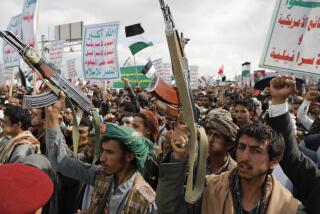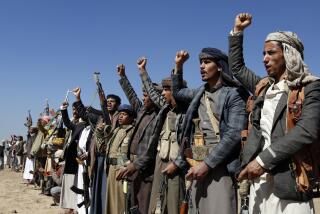Terror Suspect Aided Poor at Home in Yemen
- Share via
SANA, Yemen — The United States says that Sheik Mohammed Ali Hassan Mouyad was an associate of one of Al Qaeda’s chief plotters and instrumental in helping to funnel cash to the terrorist network.
But in Yemen, Mouyad is widely known for feeding, educating and clothing the poor; for his work as a consultant to the Ministry of Endowments; and for his role as a leader in the main opposition party, called Islah.
Mouyad and his personal secretary were detained Friday in Germany, and on Saturday, a German judge ordered the pair held pending an extradition request from the United States.
Mouyad’s high profile at home and the surprise here that greeted news of his arrest point to some of the reasons why many in the Arab world have trouble accepting the American definition of a terrorist and the thrust of the U.S. campaign against terrorist organizations. They are also a reminder that reaching into the Islamic community to grab suspects can exacerbate anti-American sentiment at a time when the Arab world is already fearful about a possible invasion of Iraq.
“These acts of the United States make all Muslims to be Al Qaeda,” said Hamoud Hashem Zerahi, a member of the Supreme Council of Islah, an Islamist-based opposition political party. “The U.S. makes no difference between moderates and extremists, and this makes us all think the accused is Islam and not terrorism.”
By any measure, Mouyad’s arrest is bad news for the poor in Yemen, a nation the U.N. ranks as 148th among the world’s 174 least developed countries. The capital, Sana, is a city in disrepair, crowded beyond its means, with many of its 1 million citizens having trouble finding adequate food and clothing. Yemen’s government is trying to reform the economy, attract investment and raise the money it needs to provide basic services -- like running water -- but is far from reaching those goals.
Filling the void in providing help are institutions such as Al Ehsan Mosque and Community Center, a sprawling complex that Mouyad founded in the mid-1990s as a center to tend to the body as well as the soul. The poor go there to pray and for food. The bakery gives away 18,000 pieces of bread each day. That helps feed about 9,000 families who come from all over the city, according to the bakery manager, Bandar Daifani, 24.
The poor also go there to see doctors, even psychiatrists. They send their children to school there. They go to access the Internet.
And everything is free.
That kind of giving wins widespread loyalty in a country where the United Nations says there are “extremely high rates of malnutrition, low birth weight and infant mortality.”
Mouyad also preaches at the mosque and, according to people in the crowd gathered at his house Saturday, he has frequently preached against terrorism. He denounced Al Qaeda and the recent fatal shootings of three Baptist missionaries in the southern city of Jibla, they said. Did he also preach against America? No one would say; most just shrugged and glanced away, determined not to discuss Mouyad’s feelings about the United States.
Instead, they insisted that the situation was a big mistake, a case of mistaken identity, perhaps.
“My father is a victim,” said Mouyad’s oldest son, Abdul Majid Mohammed Mouyad, 25. “He is a righteous man.”
Family and friends said that Mouyad is an ill man, in his 60s, who on Monday flew to Germany for treatment of asthma and diabetes. The Ministry of Endowments helped him get the visa, according to colleagues at the center. He was arrested Friday at an airport hotel in Frankfurt, along with his personal secretary, Mohammed Moshen Yahya Zayed.
The German authorities picked the two up after a request from the U.S. Justice Department. It is alleged that Mouyad is an associate of Abd al Rahim al Nashiri, apprehended in November and accused of being Al Qaeda’s chief of operations in the Persian Gulf region. Authorities did not elaborate on what role they believe Zayed played in Al Qaeda.
Rumors have abounded since the arrest, with some suggesting that it was part of an elaborate sting operation and others suggesting that the U.S. asked the Yemeni government to turn Mouyad over some time ago, which a government official denied in a TV interview on the Arab-language Al Jazeera network.
The arrest presents difficult domestic concerns for Yemen’s president, Ali Abdullah Saleh. If the U.S. is right, and Mouyad is an Al Qaeda member, that development would suggest that the organization has penetrated deeper into the national fabric than officials here have maintained. Mouyad is a leading member of Islah, which stands a chance of wresting control of parliament away from Saleh and his ruling General People’s Congress.
So far, the Yemeni government has said it is upset about the arrest because the United States never informed it that Mouyad was wanted.
“This name was never on any list,” said a source with close ties to the government. “That has left everyone surprised.”
The same person was quick to point out Mouyad’s role in the opposition party.
It could also turn out that the case will become another stumbling block in U.S.-Yemeni relations, which have been rocky recently. Despite tensions, each side insists that they are working together well. Nevertheless, the U.S. has asked for Mouyad to be extradited, and officials said Washington plans to ask for Zayed to be turned over too. But Yemen has demanded that the men be returned here for investigation and possible trial.
The case is expected to add to anti-American rhetoric, and unless compelling evidence of Mouyad’s guilt is presented, there is a chance that hostility toward America will grow among those with ties to the ruling elite.
“This person was not known to be aligned with this organization,” said Judge Hamood Abdulhamid Hitar, a member of the high court, who said he was upset with the U.S. decision. “His name did not appear, was not indicated at all, in any investigations.”
Plus, the judge said, if Mouyad was part of Al Qaeda, would he have risked visiting Germany?
“Never,” he answered.
More to Read
Sign up for Essential California
The most important California stories and recommendations in your inbox every morning.
You may occasionally receive promotional content from the Los Angeles Times.













